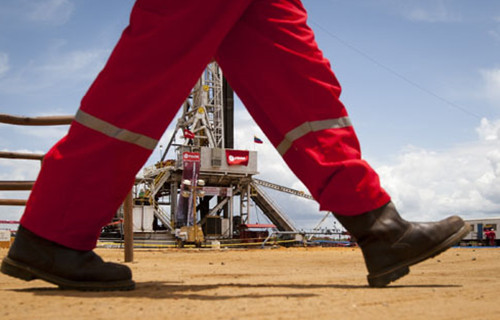导读:境外放贷量激增,已使得中国政策银行高度暴露在多个国家的违约风险之下,进而迫使中国政府展开反思,其结果可能重塑中国与发展中经济体合作的方式。

A surge in overseas lending has left Chinese policy banks highly exposed to countries at risk of default, forcing a rethink that could reshape its engagement with developing economies.
境外放贷量激增,已使得中国政策银行高度暴露在多个国家的违约风险之下,进而迫使中国政府展开反思,其结果可能重塑中国与发展中经济体合作的方式。
A Financial Times analysis shows that six of the 10 biggest recipients of Chinese development finance between 2013 and 2015 are considered to be most at risk of default using an Organisation for Economic Co-operation and Development measure. By contrast only two of the top 10 recipients of World Bank development loans between 2011 and 2015 were in the same risk category.
《金融时报》的一项分析表明,依据经合组织的衡量标准,中国在2013年到2015年期间发放的发展融资的10大接收国中,有6个被认为违约风险最高。相比之下,世界银行在2011年到2015年期间的发展贷款的前10个接收国中,只有两个国家处于同一风险类别。
Last year Xi Jinping, the Chinese president, pledged $35bn in preferential loans to Africa in a gesture meant to reassure its partners on the continent that China’s interest extended beyond extracting oil and resources.
去年,中国国家主席习近平承诺向非洲提供350亿美元优惠贷款。此举旨在表明一种姿态,目的是让非洲大陆的伙伴国相信,中国并不只是对开采石油和其他资源感兴趣。
But with oil prices around $50 a barrel undermining borrowers’ ability to repay oil-backed loans, Chinese lenders and African borrowers are becoming more cautious in signing up to new projects. Some oil-backed loans have turned sour, leading to debt renegotiations from Chad to Ghana and Angola.
然而,目前油价每桶在50美元左右,削弱了借款国偿付以石油作为抵押物的贷款的能力,在这种情况下,中资银行和非洲借款国对于签署新项目变得更加谨慎。部分以石油作为抵押物的贷款已转变为不良贷款,中国为此与乍得、加纳、安哥拉等国家重新磋商了债务条款。
The disintegration of the Venezuelan economy has also caused many within China to question China Development Bank’s overseas lending and risk assessment.
委内瑞拉经济崩溃也让中国国内许多人开始质疑中国国家开发银行的海外放贷行为和风险评估。
"China continues to talk about its mutual beneficial relationships with these commodity-rich countries but something has fundamentally changed, for the worse, in the commodity exporting countries in Africa and South America," said Matt Ferchen, a scholar at the Carnegie-Tsinghua Center in Beijing.
北京的清华-卡内基全球政策中心的学者陈懋修表示:“中国仍在继续谈论其与拥有丰富大宗商品资源的国家之间互惠互利的关系,然而在非洲和南美的大宗商品出口国,某种东西已经发生了根本性的变化,并且是向坏的方向发展。”
In response, China is shifting its focus from risky clients such as Zimbabwe and Sudan to alternatives such as Ethiopia, now emerging as a regional manufacturing powerhouse. this month, a $3.4bn electrified railway service, financed and built by China, began service between Addis Ababa and Djibouti, where China is building its first overseas naval base.
针对这种局面,中国正在将重心从津巴布韦和苏丹等高风险客户转向埃塞俄比亚等其他国家,埃塞俄比亚如今已成为地区性的制造业大国。就在本月,从亚的斯亚贝巴到吉布提,一条由中方提供融资并建造、总投资34亿美元的电气化铁路开始通车运营。中国目前正在吉布提建造首个海外海军基地。
China is also trying to spread its lending more evenly among its policy banks and its commercial banks. But it has found that commercial banks are less willing to make extravagant bets and require a much lower risk before signing off on a project, analysts said. Chinese policy banks are more inclined to accept projects considered politically expedient.
中国还试图让国内商业银行与政策性银行更为平均地分担境外放贷任务。然而,分析师表示,商业银行参与豪赌的意愿较弱,风险水平必须要低得多,它们才会签署一个项目。相比之下,中国政策性银行更愿意接受被认为在政治上有利的项目。
The push to include commercial banks has led to renegotiations of many state-to-state deals agreed between politicians. “They have the big ceremony and announce the deal only to be told by the commercial banks that the project isn’t bankable,” said one risk analyst at an international bank.
让商业银行参与境外放贷的努力,已导致多项由政治家达成的国家间协议进行了重新磋商。某跨国银行的一名风险分析师表示:“他们举行了盛大的仪式,公布了协议,结果却被商业银行告知项目不靠谱。
Chinese policy banks do not have clear cut debt sustainability limits when making loans, unlike the World Bank, says Deborah Brautigam, China Africa scholar at SAIS.
高级国际问题研究院中国与非洲问题学者德博拉.布罗蒂加姆表示,与世界银行不同,中国政策性银行在放贷方面没有明确的与债务可持续性相关的限制。
This results in unrealistic deals such as the $3bn credit line extended to Ghana by CDB in 2010, part of which was drawn down for a natural gas project that became embroiled in delays.
这导致了一些不切实际的交易,比如2010年中国国开行向加纳提供的30亿美元贷款额度,其中一部分用在一个天然气项目,然而目前已被推迟。
In Angola as well, deals secured with daily oil exports have been revised so that larger amounts of oil need to be exported daily — a measure built into the original deals, according to Ms Brautigam.
还有在安哥拉,以每日石油出口量作为担保的多项协议也被修改,从而提高了每天需出口石油的数量——根据布罗蒂加姆女士的说法,这是最初协议中规定的做法。
China Export-import Bank has traditionally taken the lead in lending in Africa, but some outside observers believe its portfolio may be nearing saturation.
中国进出口银行向来是中国对非洲放贷的领头银行,不过一些外部观察人士认为,该行的投资组合或已接近饱和。
CDB, which expanded its overseas lending aggressively during the oil boom, has more concentrated exposure. Both banks saw an increase in capital in April 2015 after the drop in oil prices revealed the extent of their exposure to oil exporters. The increase was ostensibly to support China’s strategic One Belt, One Road programme.
中国国家开发银行在石油繁荣期间对境外大举放贷,其风险敞口更集中一些。在油价下跌暴露出这两家银行对石油出口国存在较大的风险敞口之后,2015年4月,两家银行的资本金都有所扩大。此番增资似乎是为了支持国家的“一带一路”战略。







